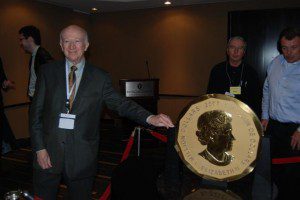The chief institutional strategist at Canada’s biggest bank, Royal Bank of Canada (RBC), believes gold prices are probably heading the way of the NASDAQ in the 1990s and the Nikkei in the 1980s into mania territory on the road to $3,800 an ounce. Words: 647
So says Myles Zyblock at RBC in an article* by Eric Roseman (roseman.sovereignsociety.com) which Lorimer Wilson, editor of www.munKNEE.com, has reformatted and edited below for the sake of clarity and brevity to ensure a fast and easy read. (Please note that this paragraph must be included in any article re-posting to avoid copyright infringement.) Zyblock goes on to say:
“Gold is morphing into a ‘no lose’ asset class, setting the stage for another bubble. The real fireworks might still be several quarters away.”
According to Zyblock, three characteristics of a mania apply to gold currently:

2. there is a sense that potential gains in gold are unlimited and
3. an opportunity exists for large and small investors alike to be buyers of gold bullion.
The only roadblocks to Zyblock’s forecast for gold are:
1. higher U.S. interest rates, which remains an unlikely event in an ongoing environment of debt retrenchment at the consumer level,
2. an ongoing bear market in housing coupled by a foreclosures fiasco, and
3. weak employment growth.
Editor’s Note: Don’t forget to sign up for our FREE weekly “Top 100 Stock Market, Asset Ratio & Economic Indicators in Review”
Historically, the Fed has never hiked lending rates amid a weak jobs market.
I would have to agree with Mr. Zyblock about gold heading into “bubble” territory at some stage. Since 2000, the gold bull market has been one of tempered enthusiasm with sizable calendar year gains in every year but nothing spectacular compared to palladium or tin [which have] more than doubled in value over the last 12 months. This has not been a mind-blowing bull market in gold; instead, it’s been a quiet or stealth secular rally within the confines of a steadily appreciating trend.
What Higher Gold Prices Will Mean for World’s Currencies
It would seem plausible that by the time gold fetches prices far and above anyone’s imagination, which I believe is the possible outcome, the Fed and other governments will have already worked on introducing some sort of new exchange rate mechanism to stabilize the U.S. dollar. This might also coincide with a fully convertible Chinese currency, which would be bearish for the dollar. At that point, investors should start unloading [their holdings of gold]. That’s tomorrow’s story and tomorrow is a long way off.
I suspect that as we continue to rally in the price of gold on the road to $2,500, or $3,800 for that matter [as] the Chinese morph into the biggest single source of demand for gold bullion… building their reserves the same way previous great global powers did in the 20th and 19th centuries.
China doesn’t need all of these crummy USD and EUR. China is following the same path to economic prowess as her predecessors. The events played out in the United States from 1913 to 1971 and Great Britain from approximately 1750 to 1900 serve as a strong model for global investors.
[China’s accumulation of much more gold will result in gold going parabolic!]
*http://roseman.sovereignsociety.com/2010/10/29/rbc-projects-gold-bubble-on-road-to-3800/
Editor’s Note:
- The above article consists of reformatted edited excerpts from the original for the sake of brevity, clarity and to ensure a fast and easy read. The author’s views and conclusions are unaltered.
- Permission to reprint in whole or in part is gladly granted, provided full credit is given as per paragraph 2 above.
- Sign up to receive every article posted via Twitter, Facebook, RSS feed or our FREE Weekly Newsletter.
- Submit a comment. Share your views on the subject with all our readers.
Gold
 munKNEE.com Your Key to Making Money
munKNEE.com Your Key to Making Money